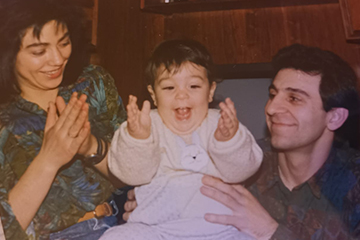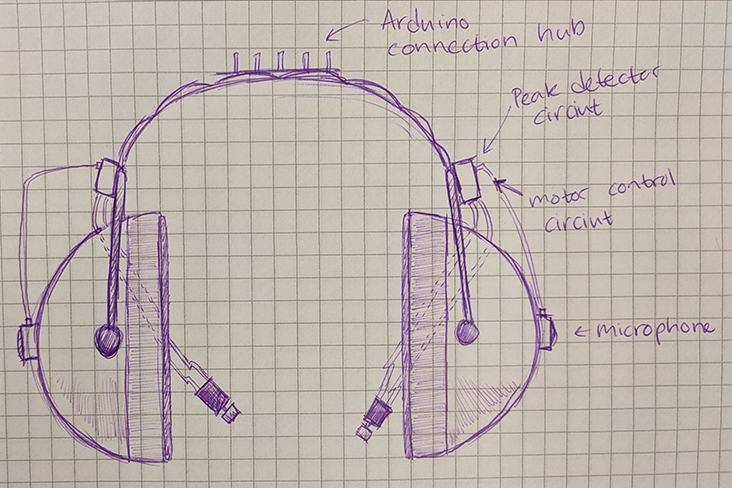Behind the many startups of the EIT Digital Alumni community are untold stories of motivation, passion, ambition and success. This time around, we sat with Adrián Neila Serrano as he talked about InSignum, a contestant of the EIT Digital Alumni Startup Contest 2020.
“Growing up, I never felt special or different,” says Adrián, explaining what it’s like to be raised by parents who are both deaf. “It felt natural because that’s just your reality. You learn everything unconsciously, you find ways around problems that arise, just like everybody else.”
Inspired by his parents, Adrián started working on technology to make the world more accessible to people that are hard of hearing, calling his initiative InSignum.
Adrián's inspiration
Adrián admits, however, that he was sometimes forced to mature earlier than his peers. “When I was a child and my mom wanted to go to the bank, I had to accompany her so I could help.”
Besides the obvious communication difficulties, those who are deaf often face issues with literacy. “My dad, for example, can conjugate verbs, but my mom has trouble with it. We have to remember that their mother tongue is sign language, not Spanish.”
“It’s better nowadays but deaf people used to be much more isolated. It’s a cultural issue because it involves society in general.” Communication is a two-way process, after all.
According to Adrián, this is a common worry among the deaf. “We need more empathy but it’s hard to empathise with someone if you’re not exposed to their reality. There is not enough interest, not much effort is invested in marginal groups like the deaf.”
When his parents came to visit him in Paris, they had trouble figuring out all the procedures for travellers. Even at their departure airport in Madrid, it was difficult to understand what steps to take, and they couldn’t clarify their doubts because there is often no one speaking sign language.
For Adrián, his parents are his inspiration, in more ways than one. “Humans learn from experience,” says Adrián, reflecting on the source of his ideas.
“One day I did some thought experiments. What if I wanted to go to university in a wheelchair? Many pavements don’t have ramps, you might need help getting on a bus. It takes twice as long because of all the obstacles.”

Adrian as a toddler, with his parents
As the conversation wore on, it became increasingly apparent that Adrian’s passion and enthusiasm is what drives him. He is deeply knowledgeable about issues faced by the deaf, and driven to keep finding new and better solutions.
Developing an idea
Having studied computer science in Madrid, Adrián is currently part of the Human-Computer Interaction Design programme of the EIT Digital Master School. “It’s perfect because it’s computer science plus psychology and design, but also with entrepreneurship,” he says.
That’s where he met some of the people who have helped him develop wearables that help deaf people become aware of sounds in their surroundings.
“The toughest part for me is bringing and keeping people in the team. There were 5 or 6 people who worked with me for 6 months as part of a study project, but they are now spread across the world - in China, Portugal, Sweden - so it’s difficult.” After moving to Paris, 3 other students jumped in to help develop other prototypes.

Sketch of prototype headphones
Adrián did, however, meet some industry experts while at the KTH Royal Institute of Technology. When he presented his idea during an entrepreneurial course, one of the jury members offered to help.
“He told me that I can test the product on him, because he uses a hearing aid. As it turns out, 1 in 3 people above the age of 65 have hearing difficulties, so a lot of people stand to benefit. He later became my mentor.”
The solution
Together with his teammates, Adrián created a prototype of a wearable device that picks up sounds and triggers pertinent vibrations on a vibrating belt. The louder the sound, the stronger the vibration.
A new InSignum product, called Home, is also on the way. “I am currently developing vibrations that link sounds with lights. This type of concept is already being used with simple light bulbs in alarm clocks and doorbells for deaf people,” he explains. “One issue of the current solutions is that if you don’t look in the direction of a lamp that is signalling you, you’ll miss the signal.”
"However, technology is more advanced now. We can use LED lights stripes allowing bigger areas, different colours, movements, etc. But first we need to find out how potential users experience the product."
The future
For Adrián, wearables are the future. “Wearable technology is less prominent, so it doesn’t stand out too much. It makes it less awkward for the deaf, who may not want to be noticed for being deaf.”
“Deafness is an invisible disability,” he opines in closing.
--
InSignum is a participant of the EIT Digital Alumni Startup Contest 2020. Watch Adrián’s contest pitch video on our YouTube.
